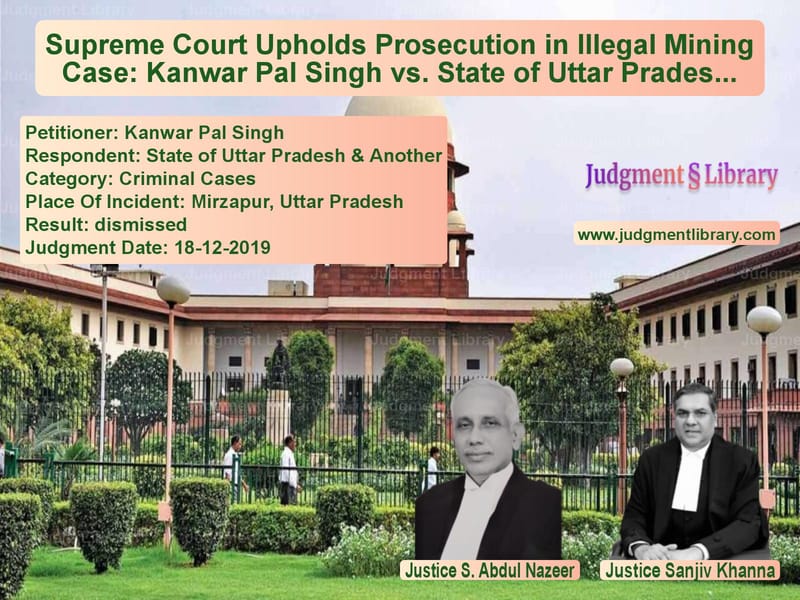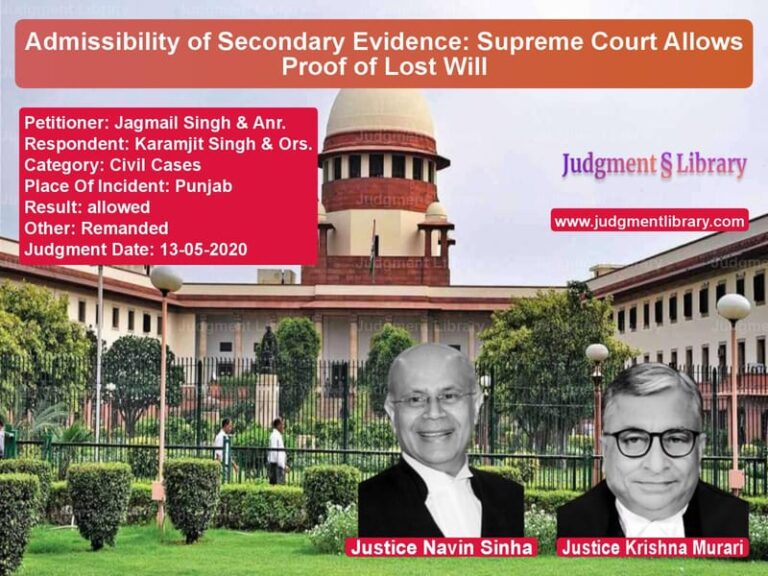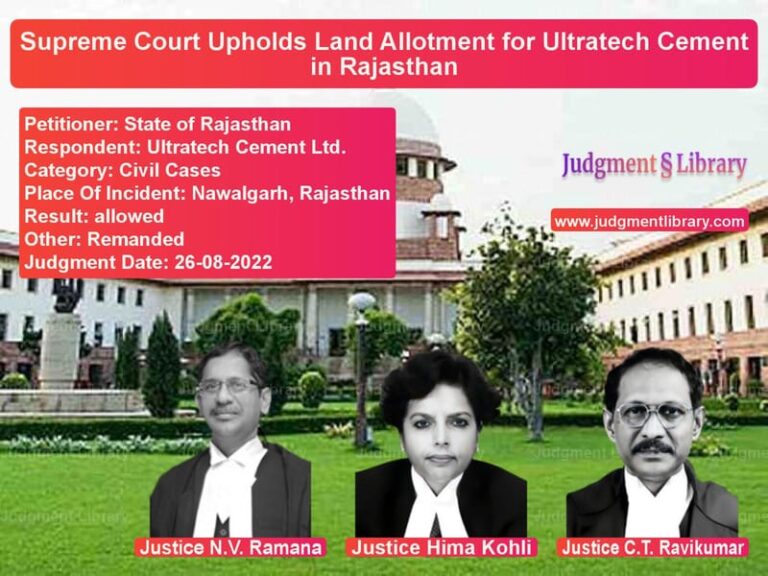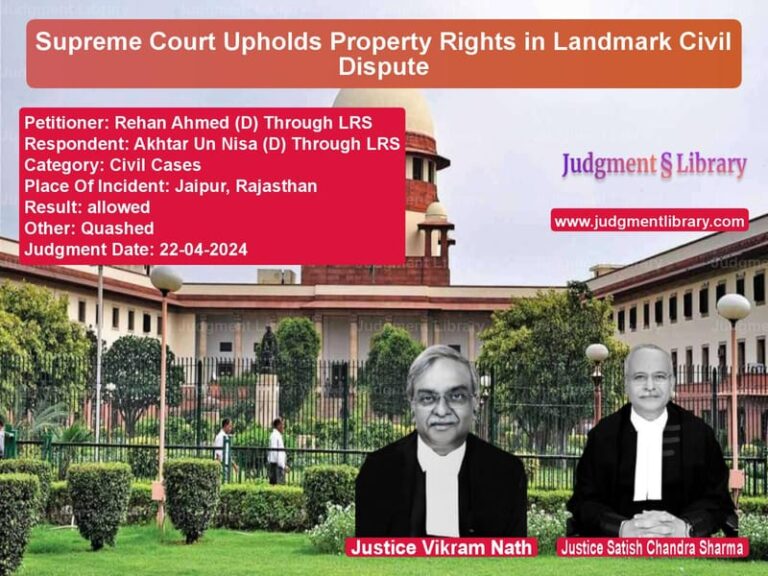Supreme Court Upholds Prosecution in Illegal Mining Case: Kanwar Pal Singh vs. State of Uttar Pradesh
The Supreme Court, in Kanwar Pal Singh vs. State of Uttar Pradesh & Another, delivered a crucial judgment on the prosecution of illegal mining and the role of the police in investigating such offenses under the Mines and Minerals (Development and Regulation) Act, 1957. The ruling clarifies the scope of criminal liability under the Indian Penal Code (IPC) and the Mines Regulation Act.
Background of the Case
The case arose from allegations of illegal mining against the appellant, Kanwar Pal Singh, who was the director of M/s. Kanwar Enterprises Pvt. Ltd. The company held a mining lease for extracting sand in Village Nandni, Tehsil Sadar, District Mirzapur. However, it was alleged that the appellant had illegally mined sand outside the permitted lease area, specifically in Village Babhni, thereby violating mining laws.
An FIR was registered on 15th November 2018 based on a complaint by a Mines Department surveyor, following an inspection by the Nayab Tehsildar. The FIR invoked Sections 379 (theft) of the IPC, Sections 3 and 4 of the Prevention of Damage to Public Property Act, 1984, and multiple provisions of the Mines Regulation Act.
The appellant challenged the FIR and subsequent charge sheet, arguing that the police had no authority to prosecute offenses under the Mines Regulation Act. He sought relief under Section 482 of the Code of Criminal Procedure, 1973, to quash the criminal proceedings. The High Court of Allahabad dismissed his petition, prompting the appeal to the Supreme Court.
Legal Issues Before the Supreme Court
- Whether prosecution under the IPC for theft (Section 379) is maintainable in cases of illegal mining.
- Whether police have the authority to investigate and file charge sheets for violations under the Mines Regulation Act.
- Whether the appellant’s mining lease granted him immunity from prosecution for exceeding the permitted lease area.
- Whether the cognizance taken by the Magistrate was valid.
Arguments by the Appellant (Kanwar Pal Singh)
- The appellant argued that the alleged offense falls exclusively under the Mines Regulation Act, which requires prosecution to be initiated only by an authorized officer of the State or Central Government.
- Since the police had filed the charge sheet, it was contended that the proceedings were vitiated and illegal.
- Reliance was placed on previous judgments, including Jeewan Kumar Raut vs. CBI, where it was held that a special law prevails over a general law.
- It was contended that as the company held a valid mining lease, the issue, at best, amounted to a regulatory violation rather than a criminal offense.
Arguments by the Respondent (State of Uttar Pradesh)
- The State argued that the appellant had illegally extracted sand from an area outside the leased land, making the offense punishable under both the IPC and the Mines Regulation Act.
- The offense of theft under Section 379 of the IPC was distinct from violations under the Mines Regulation Act, and thus, police had the authority to investigate and prosecute the case.
- The public trust doctrine was invoked, emphasizing that minerals belong to the State and their illegal extraction constitutes theft.
- The prosecution was validly initiated since illegal mining is a cognizable offense under the Mines Regulation Act.
Supreme Court’s Judgment
The Supreme Court dismissed the appeal, upholding the High Court’s decision and allowing the prosecution to proceed.
The Court ruled:
“The prohibition under Section 22 of the Mines Regulation Act does not bar police from prosecuting cases of theft under the IPC. When a person, without legal authority, extracts minerals and removes them, it constitutes theft under Section 378 of the IPC.”
The Court further held:
“The appellant cannot claim immunity from prosecution merely because he held a mining lease. Extraction beyond the leased area constitutes a criminal offense.”
Additionally, the Court relied on its previous ruling in Sanjay vs. State (NCT of Delhi), where it was held that offenses under the IPC and special laws can coexist, provided they involve different legal ingredients.
Key Takeaways from the Judgment
- Illegal mining, when carried out beyond the lease area, can be prosecuted as theft under the IPC.
- Section 22 of the Mines Regulation Act does not bar the police from investigating and filing charge sheets for offenses under general criminal law.
- The public trust doctrine applies to natural resources, and their unlawful extraction is punishable under criminal law.
- Courts should not interfere in criminal proceedings unless a clear abuse of process is established.
Final Decision
- The Supreme Court dismissed the appeal, allowing the criminal prosecution to proceed.
- The High Court’s order refusing to quash the FIR and charge sheet was upheld.
- The trial court was directed to proceed with the case based on evidence without being influenced by the legal challenges raised.
Implications of the Judgment
This judgment strengthens the legal framework for prosecuting illegal mining, reaffirming that violators cannot escape liability by citing procedural technicalities. It also upholds the principle that theft of natural resources is a criminal offense under general law, ensuring better enforcement of environmental and resource protection laws.
Petitioner Name: Kanwar Pal Singh.Respondent Name: State of Uttar Pradesh & Another.Judgment By: Justice S. Abdul Nazeer, Justice Sanjiv Khanna.Place Of Incident: Mirzapur, Uttar Pradesh.Judgment Date: 18-12-2019.
Don’t miss out on the full details! Download the complete judgment in PDF format below and gain valuable insights instantly!
Download Judgment: Kanwar Pal Singh vs State of Uttar Prade Supreme Court of India Judgment Dated 18-12-2019.pdf
Direct Downlaod Judgment: Direct downlaod this Judgment
See all petitions in Fraud and Forgery
See all petitions in Theft and Robbery Cases
See all petitions in Custodial Deaths and Police Misconduct
See all petitions in Extortion and Blackmail
See all petitions in Judgment by S. Abdul Nazeer
See all petitions in Judgment by Sanjiv Khanna
See all petitions in dismissed
See all petitions in supreme court of India judgments December 2019
See all petitions in 2019 judgments
See all posts in Criminal Cases Category
See all allowed petitions in Criminal Cases Category
See all Dismissed petitions in Criminal Cases Category
See all partially allowed petitions in Criminal Cases Category







